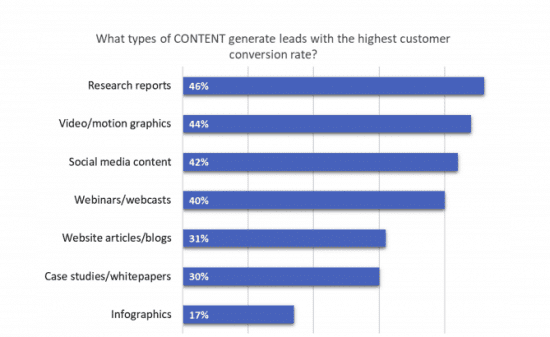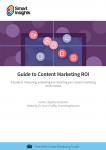We talked to Michael Goldberg to find out how he ensures content quality on a global scale and its impact on ROI
 We still often hear marketers say the truism “content is king”. We know it is important to marketing and communications for many businesses, but there is the question of how it can be managed strategically, particularly in a large global business.
We still often hear marketers say the truism “content is king”. We know it is important to marketing and communications for many businesses, but there is the question of how it can be managed strategically, particularly in a large global business.
In this interview, we’re fortunate to be able to learn from Michael Goldberg, a marcomms professional who is responsible for content marketing strategy at Dun & Bradstreet, a global B2B Brand.
We’re featuring this interview from Michael, since he is a keynote speaker alongside other global managers implementing Digital Transformation at the Marketing Leadership Forum.
Content marketing can be one of the most powerful marketing techniques for online digital brands (organically or paid) if done properly and evaluated correctly. By producing high quality and engaging content, you can harness the power of SEO and conversion in the same post and other inbound marketing techniques such as:
- PPC (paid search marketing)
- Social Media marketing
- Email marketing
Writing content that informs your target audience of your product, services or the areas of marketing that your company are experts in, increases shareability and provides content for your email newsletters, and social media platforms, ultimately creating a multichannel lifecycle engagement strategy.
This will bring together all your digital communications and help conversions, retention and growth goals, whilst reducing the need for separate individual plans for each digital technique.
In this recent study, it was found that content that includes research reports produce the highest customer conversion rates (46%) followed by content that displays video and motion graphics produce leads (44%). With different types of content marketing important for different personas at different points in the customer lifecycle, you can see the importance of a strategic approach to content marketing.
But where do you start? We asked Michael Goldberg his thoughts on content marketing, and what the future holds for content.
Ensuring quality content
As the Director, Global Content Marketing at Dun & Bradstreet, how do you ensure the quality and effectiveness of different types of content at a business with your global scale?
First, it’s important to ensure that everyone understands what the purpose of each piece of content we are creating is all about. Making sure everyone on the team understands what the story is, who the audience we’re writing for is, and what we want the reader to walk away from, really helps everyone work collaboratively to ensure its success.
That collaboration is key; great content is not created in silos. From the creative team designing and building the asset to the inbound and outbound team responsible for driving engagement for the content, we all need to be on the same page to make it work. As they say, it takes a village.
Second, once everyone understands the plan we have for content and how we will be using it and why, it is shared and saved internally within our content management platform. Here each piece of content is tagged and labeled so other teams know how it’s being used and for what purpose. This makes it easy for other teams to find it and use it as it is intended down the road.
Strategy and planning for content marketing
What is your view on the value of having a content marketing or audience engagement strategy and plan for each business area/market? Should this be defined as a separate document to achieve focus, or integrated into other communications plans?
Not to get overly philosophical on you, but, if a piece of content is written, and no one is around to read it, does it make an impact? Without a carefully planned audience engagement strategy, content cannot be effective no matter how good it is.
Making sure it is reaching the right audience is paramount, for which you need a distribution or campaign plan. What’s more, it’s crucial to understand that audience – their goals and challenges – and write content that resonated with them. That said, this has to be an integrated strategy that is part of the foundation for every piece of content that is being written.
Content marketing ROI
As the focus on Content Marketing has increased there has been more discussion on how to achieve ROI from content Marketing. What guidance do you give your teams at D&B as to how to assess Content Marketing ROI?
It’s hard to come up with a clear-cut ROI calculator for content marketing. It’s not always so black and white. Good content is not designed to drive an immediate purchase, it is designed to give the reader something of value and open a dialogue for future conversations.
There are some attribution metrics that could be used to gauge the ROI of some content, but it’s not a perfect science. Instead, you can look at basic engagement and social metrics to ensure the content is resonating with the intended audience. It also helps to do some internal metrics and see how the sales team uses content to help their pipeline.
Disruptive technologies for content marketing?
Which disruptive technologies are you evaluating which you are most excited about applying to content marketing across D&B in the future?
Everyone seems to be talking about Artificial Intelligence (AI). There certainly are some interesting possibilities here, though I don’t think a computer will ever be writing any content – at least any really good content that is wrought with emotional language. Instead, I think AI will help us better understand what our audience wants quicker. It should also help us automate content distribution.
I’m more interested in creative technologies like augmented reality. New ways of telling stories where the reader can be fully immersed in the experience beyond words is a very exciting notion.
Learn more
If you want to know more about content marketing strategy from Michael, he is one of many keynote speakers at the Marketing Leadership Forum on Ocrober 5-6.
Registration has just opened for the events, the highest level marketing event taking place this year at the Four Seasons Westlake Village, Malibu, CA on October 5-6.
Features a remarkable line-up of 45+ Marketing Gurus and Experts including:
• David Jaye, Chief Marketing Officer/Chief Digital Officer, IBM
• Christine Nashick, Chief Marketing Officer, DHL Express
• Shonodeep Modak, Chief Marketing Officer, GE Industrial Solutions
• Mark Zarthar, Global Head of Sports Marketing, Anheuser-Busch InBev
• Ted Hutcheson, Vice President, Global Creative and Content, Ashley Furniture Industries
• Rick Wion, Senior Director, Consumer Engagement, Kellogg Company
• Josslyn Mikow, Senior Content Strategist, eBay, Inc
• Ryan Lauder, Director, Customer Engagement, Taylor-Made Adidas Golf
To better understand the event, please click here: http://events.marcusevans-events.com/marketing-leadership-forumna17/
Connect with 80+ CMOs, Heads of Digital, Customer Engagement and Content Strategy Specialists and tailor your personal agenda based on the 4 streamed program.
To apply for a place contact [email protected]
Contact us at [email protected] by September 25 to find out how you can receive a $500 discount off the standard price

